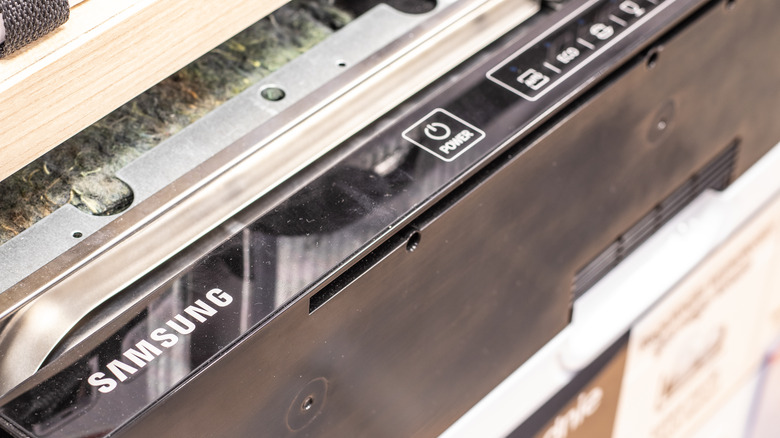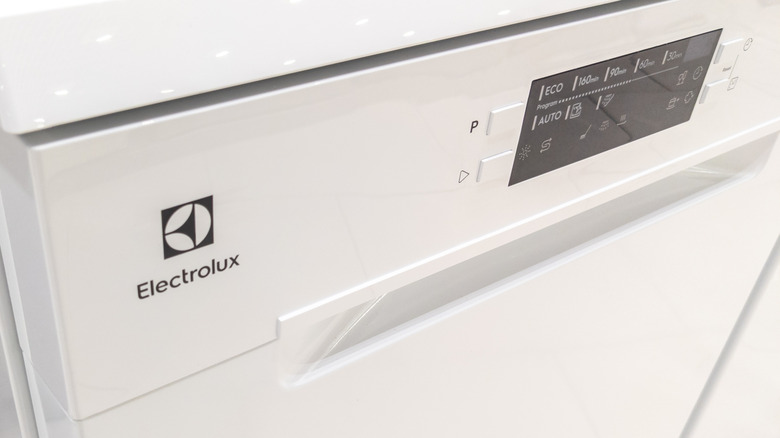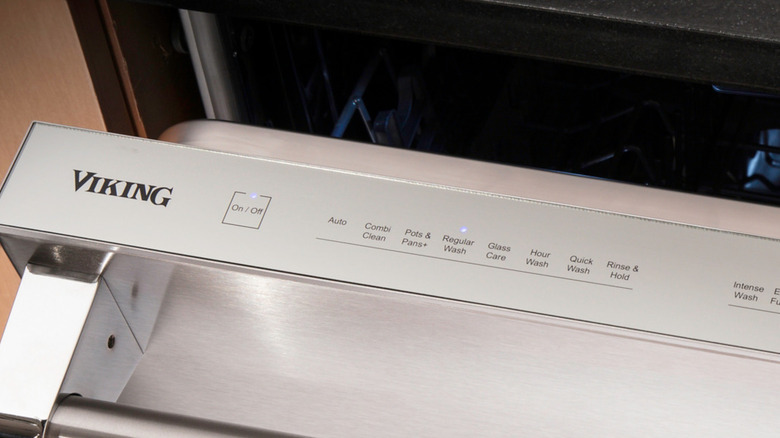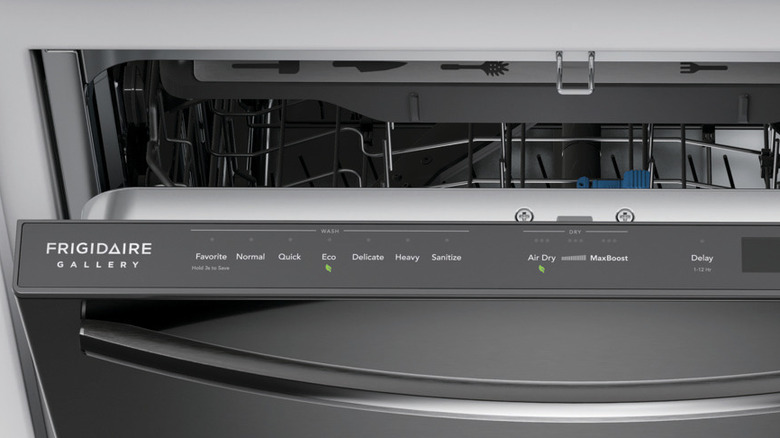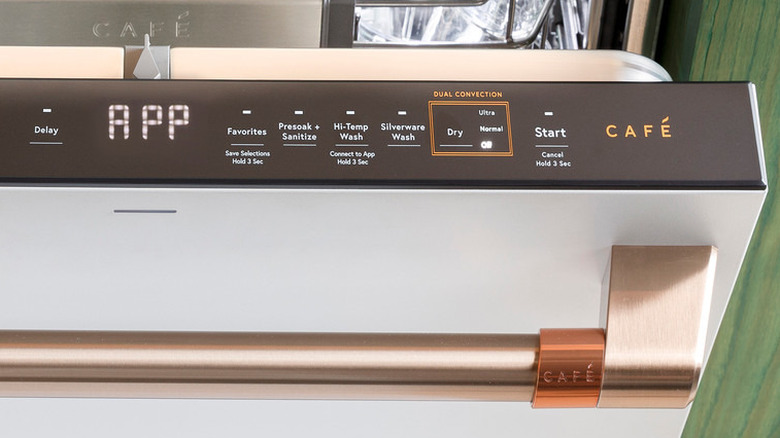5 Dishwasher Brands To Avoid Buying And What You Should Consider Instead
In some ways, it's easier to identify poor appliance brands than it is to identify poor appliances. Any particular brand can produce good and bad appliances, though in the steamy world of dishwashers, good models can be harder to come. Ask almost anyone and they'll tell you that new dishwashers seem to be terrible. Aside from a special short-cycle dishwasher category that's being tested in court, users complain that dishwashers are slow and unreliable. But, some companies consistently make great dishwashers, and there are some brands that consistently make bad ones. You need to know which is which by the time you finally admit that your current dishwasher is too old and needs to be replaced.
Before we get to the baddies, let's have a look at a few brands you should be considering instead. Thermador, Miele, and Bosch dishwashers are regularly given a thumbs-up by Consumer Reports and Yale Appliance. Miele is probably at the top of that list based on the small number of service calls their dishwashers require, and Thermador might be at the bottom of the elite group based on its relatively sparse feature offerings. Any of these three brands is a relatively safe bet for your new dishwasher, but prepare yourself — spending less than you can afford is one of the mistakes everyone makes when buying dishwashers. The best brands don't skimp on quality parts like pumps and heating elements, so their average prices ($1091.41 for Bosch, 1965.67 for Thermador, and $1979 for Miele) can be a shock. By comparison, the average price of Samsung dishwashers is $670.11. Frankly, it shows.
Samsung
Samsung dishwashers are a classic "you had one job" scenario — they have one job (cleaning dishes) and often fail at it in three or four different ways. These dishwashers are prone to turning out dishes that are still dirty and soaking wet. Both of these can be signs of poor drainage, but that's not the only quality issue plaguing Samsung. Their dishwashers also have a reputation for leaking or throwing error codes and not turning on at all. Leaking is a serious issue that can cost you far more than the price of a cheap dishwasher, since it can contribute to ruined flooring, mold problems, and even structural issues with your home. Often, though, dishwasher leaks are related to drainage problems and might not produce enough water to damage your subfloor or framing. Other common Samsung problems include poor customer service and difficulty finding both parts and technicians.
Samsung has a reputation for solid consumer electronics, but that reputation doesn't extend to its appliance offerings. Over the past four years, Consumer Reports has consistently rated Samsung around the 20th most reliable appliance brand ... solidly on the low end of mediocre. Samsung dishwashers often seem to get positive reviews on retailer websites, but the hijinks of marketing companies has made that metric unreliable, especially compared with the far more concrete data available about service calls and potential reliability.
Electrolux
That reliability data includes Consumer Reports' survey and service data on over 400,000 appliances, including dishwashers. Electrolux dishwashers are some of the least reliable of those. This is a case where a company can manage to make both good and bad dishwashers. But, unfortunately, it doesn't take many bad ones to spoil the brand's reputation. Common complaints include problems cleaning thoroughly, redeposit issues (in which food particles migrate from one dish to another — or all of the others — during "cleaning"), and models overpriced for their capabilities and performance.
Reviewers agree with the list of problems above and add a few of their own, depending on the model. Purchasers complain about leaking, controls that randomly operate themselves, and loading problems. But, by far the most common complaints have to do with cleaning issues and build quality problems. Build quality complaints are often expressions of discomfort with a product's price, and that seems to be the case here. Reviewers were expecting high-end fit and finish for the price they paid, and they didn't get it.
Viking
Customers expecting a luxury product and getting something sub-par or even mediocre is a particular burden for Viking. This well-known maker of commercial and high-end home cooking appliances has been struggling in recent years with a now-established as a reputation for making truly unreliable appliances. It's essentially impossible to find a complaint about dishwashers that doesn't regularly crop up in Viking reviews — everything from frequent breakdowns to poor loading options and an inability to dry dishes.
It's not just the higher-priced models that violate purchasers' expectations. Some of the worst dishwasher ratings we've seen have been attached to sub-$1300 Viking models. One purchaser is replacing a Viking FDWU324 ($1299) that's still under warranty because they've had it serviced for leaks, a faulty sprayer mechanism, pump failure, and overflow issues that resulted in multiple cases of flooring damage. Indeed, flooding as a result of Viking dishwashers is one of the more common complaints, and not one that buyers of either high-end or mid-range dishwashers take lightly — neither should you.
Frigidaire
As a brand, Frigidaire has been holding its own and improving steadily for the past few years. But, the company consistently struggles to make dishwashers, washing machines, and dryers that meet consumer's expectations. When it comes to dishwashers, consumer expectations should be pretty low given that Frigidaire makes some of the most affordable dishwashers on the market. Buyers are, predictably, getting some mixed signals when it comes to the brand. In terms of reliability, the company ranks as Consumer Reports' 11th most reliable appliance maker, and Lifestory Research lists Frigidaire as the ninth most trusted dishwasher brand. The trouble is, of course, that being trusted and being reliable are two different things ... at least for a while. A bad reputation will eventually catch up with any company; just ask Viking.
While Frigidaire has been moving up through the ranks as an appliance manufacturer, their dishwasher customers have been pulling their hair out about problems with drainage, leaking, and even the door latches on various models. Dishes don't always get dry, and neither does flooring around the ones with leak issues. Buyers complain that the build quality is poor, with one reviewer noting that the plastic bottom rack is so light that it won't hold the dishwasher's door open. A metal rack might be worse, though, because another reviewer notes that when investigating reddish stains, she discovered that her racks' coated metal tines were exposed and rusting.
Haier/GE/Café
Is three-for-one a good deal if you don't want any of them? We're not really cheating by lumping Haier, GE, and Café dishwashers together. Café is a GE brand, and GE is owned by Haier. And, all three brands have substantial and similar dishwasher problems. Haier dishwashers have an emerging reputation for breaking down quickly, and no one seems overly thrilled with the company's customer service, either. These dishwashers can also be extremely expensive to repair. Just like Frigidaire, GE has a decent reputation as an appliance brand but has struggled with dishwashers, washing machines, and dryers. This is odd enough, and it's even more odd after you consider that GE's Profile line is one of the more reliable. The Café sub-brand is also lauded for having readily available service and parts.
This is a good thing, since Café dishwashers currently have the highest rate of service calls among the many brands Yale Appliance offers, with 19.2% of Café dishwasher sales resulting in a service call, 8.2% worse than the second-worst brand. Haier and GE weren't rated.

